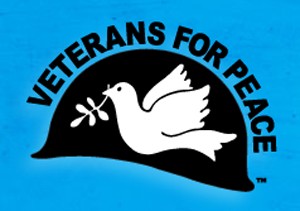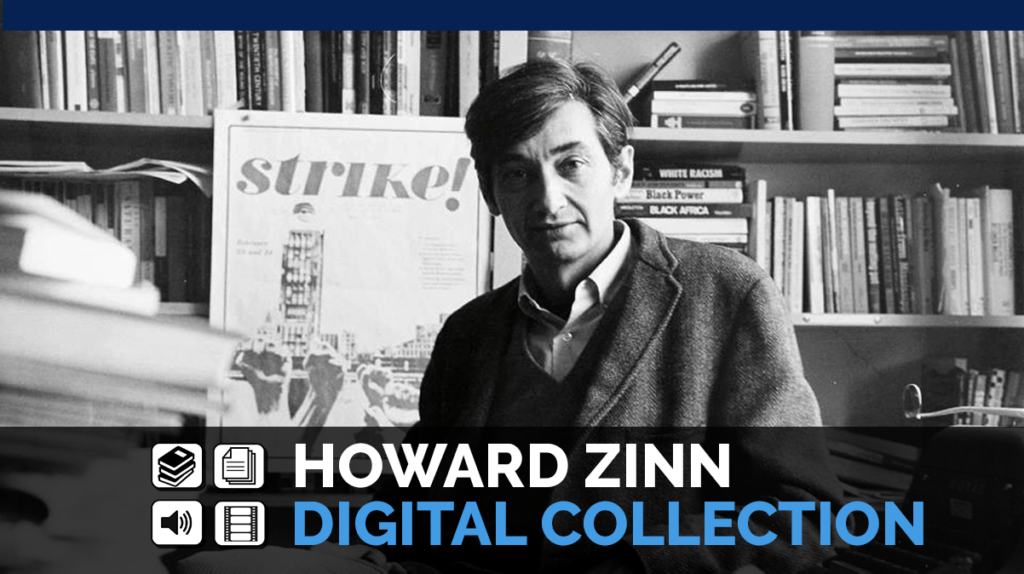Written by Board President Mike Ferner
Originally published at the Veterans for Peace website • January 28, 2010
 The death of a loved one or someone significant in our life often leaves us saying, “There weren’t many like him,” or “she’ll really leave a hole in this world.”
The death of a loved one or someone significant in our life often leaves us saying, “There weren’t many like him,” or “she’ll really leave a hole in this world.”
In the case of Dr. Howard Zinn, there was no one else like him and his passing will leave a hole we can only hope will be filled some day. He was a longtime member of Veterans For Peace.
The day before he passed, VFP received an email from Howard Zinn to confirm arrangements for June to film a video greeting for our 2010 convention. In an earlier exchange, Howard had written, “Of course my heart is with VFP, but I’m not free to come. Thanks for inviting me, and best wishes for a great event. Howard.”
As a renowned historian, he made no attempt to appear objective, indeed he thought it impossible. In an opening section of “A People’s History of the United States,” he said he preferred “to tell the story of the discovery of America from the viewpoint of the Arawaks, of the Constitution from the standpoint of the slaves…the Gilded Age as seen by southern farmers.” He believed history should “emphasize new possibilities by disclosing those hidden episodes when, even if in brief flashes, people showed their ability to resist, to join together, occasionally to win. I am supposing, or perhaps only hoping, that our future may be found in the past’s fugitive moments of compassion rather than in its solid centuries of warfare.” Then, as only Howard Zinn can, he wrote, “The reader may as well know that before going on.”
From the spring in his step to the joyful, incisive wit of his words, few would have guessed his age. But at 87, his great heart, which clearly guided his remarkable intellect, finally stopped.
There may be others with great hearts and intellects to match, but Howard Zinn will be missed because he combined those with something much rarer: courage.
Some would point to his time in World War II as a B-24 bombardier, flying missions through the red-hot shrapnel of German anti-aircraft fire and Messerschmitt machine guns. Surely that is one kind of courage. It is tempered, however, by accepting that death can strike at any moment.
In his youth, Howard Zinn had the courage of a warrior. Over many decades as an adult he had another kind of courage that he practiced often, publicly and boldly, unfettered by the usual shackles of career ambitions, money or even social acceptance by ones peers.
This kind of courage, arguably the least common, Zinn frequently brought to bear in his lifelong mission of articulating uncomfortable truths and acting against injustice.
How else to explain this historian’s ability to not only recognize the importance of the moment in the civil rights movement, but to encourage and join his students, eventually getting fired by Spelman College because they refused to participate as an institution; to speak publicly and early against the war in Vietnam when few with a safe job in academia dared; and most significantly, to fly into the hurricane of our most powerful myths and institutions by challenging “Three Holy Wars.”
In one of his last speeches he explained that these wars were not religious, but sacrosanct, “the three wars you cannot say anything bad about: the Revolutionary War, the Civil War and World War II.”
Examining his treatment of just one, the Revolution, is to begin to understand the significance of his intellect and the depth of his courage.
Zinn said that according to population differences then and now, the equivalent number of deaths today would mean “two and a half million people dying in a war to get England off our backs. Well, you might consider that worth it, or you might not.”
Challenging the customary tale of our revolution, Zinn pointed out that the year before Lexington and Concord, farmers in much of western Massachusetts drove the British government out without firing a shot. “They had assembled thousands upon thousands around court houses, around official offices and they had taken over and they said good bye to the British officials.”
Further challenging the standard story, he observed, “Canada is independent of England aren’t they? I think so. Not a bad society. They have good health care. They have a lot of things we don’t have. They didn’t fight a bloody revolutionary war.”
One problem he noted was we rarely take time to differentiate between various parts of the population “because we don’t think in class terms. We think we all have the same interests. We all have the same interests in independence from England. We did not all have the same interests.”
Perhaps most challenging, he asked, “Did blacks benefit from the Revolution? Slavery was there before; slavery was there after. No, we remained a slave society after the Revolution. Not only that, we wrote slavery into the Constitution. We legitimized it. It is always good if you want to get people to go to war to have a good document and have good words like life, liberty and the pursuit of happiness…Of course, when they write the Constitution it’s not, life, liberty and the pursuit of happiness…it’s life, liberty and property. Have you noticed that difference? You should notice. You should take notice of these little things.”
Howard Zinn took notice of all those “little things.” He took them and, in the crucible of his intellect, forged a new story of how we came to be; a story that took great courage to articulate; a story that has the power to take us a long way down the road of freedom and peace.



